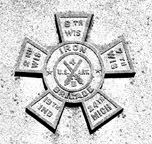“Sally had a baby, and the baby had red hair”—part one
 We’re pleased today to bring you part one of a two-part piece from guest poster Lance Herdegen, author of The Iron Brigade in Civil War and Memory.
We’re pleased today to bring you part one of a two-part piece from guest poster Lance Herdegen, author of The Iron Brigade in Civil War and Memory.
The Iron Brigade in the old Army of the Potomac made its own music. Any veteran memory of the long marching columns evoked faint echoes of the soldiers singing or the tooting of the brass bands. Sometimes it was the stern song about abolitionist John Brown and other times more scandalous airs such the one about an unexpected baby “that had red hair.” The brass bands that played them away from home so long ago performed in the morning formations and evening tattoos as well as during inspections and reviews. The Western men of the Iron Brigade sang as they marched to Gettysburg and the brigade band played “Hail, Columbia” and stirring marches as the Black Hats charged toward Seminary Ridge. In camp, soldiers gathered to sing in groups and even alone. Music was much a part of soldier life those first years of the war and the young men played violins, harmonics, and other instruments for their comrades. “How often on the long weary march,” one officer wrote later, “when it seemed as if our sore and tried limbs almost refused to go on—it was then the full swelling notes from a good band rallied us from the roadside ‘into line,’ flag unfurled, muskets at a right shoulder shift, gleaming in the bright sun, and the regiment appeared infused with new life and energy as they jauntingly marched along.”
The young officer was Loyd Grayson Harris. A native of New York State, he came into ranks at Prairie du Chien as a Union volunteer in 1861 and became an officer of the 6th Wisconsin Infantry in the Iron Brigade. Long after the war, he wrote a series of war memoirs for The Milwaukee Sunday Telegraph, light-hearted sketches of marches and camp life and much about the music of those days. Editor Jerome Watrous described him as “genial, patriotic, kindly” and said he was a writer of “more than ordinary merit, whose articles in this paper have always been read with interest.” Harris was eight when his family migrated to Wisconsin from Buffalo, New York, first to Sheboygan, and then Milwaukee. In 1856, when he was 16, Harris marched with a volunteer fire company in the funeral of Solomon Juneau the founder of Milwaukee. By age 19, Harris was on his own working as express agent in the Mississippi River community of Prairie du Chien. He was one of the first to “shoulder a musket and enter the ranks as high private.” Wealthy Industrialist Norman Wiard, who invented an ice boat that ran from Prairie du Chien to Winona, Minn., and later designed a rifled artillery barrel, gave the new recruit a gold watch that Harris would later show to President Abraham Lincoln.
It was not long after reaching Washington with his regiment that Harris was promoted to sergeant and on Oct. 31, 1861, to second lieutenant. One of his comrades remembered that before being promoted Harris had “made something of a reputation as a singer of old airs as well as the newly published army songs.” After he put on “the shoulder straps, wore better clothes, and had more leisure than a first sergeant has,” he organized a body of singers (“all young, brave and handsome,” a soldier said). It was “during the long, dreary winter of 1861-62,” the officers and men of the regiment and brigade were serenaded by the ‘Harris quartette or singing class.” His friend concluded: “I am fully conscious that Captain Harris and his associate singers saved many a man from homesickness that undid men, even strong men, that first winter in camp…”
One of those singers was Capt. Edwin Brown, who would fall at Antietam, leaving behind a wife and young children. Two others were Lt. Orin Chapman of the Crawford County Jayhawkers and Capt. John Ticknor of the Lemonweir Minute Men, both killed at Gettysburg. It was Brown those cold winter nights who would call out in a bright voice, ‘Let’s do Benny Havens.” How the men enjoyed the young officers singing the old West Point drinking song in the quiet of a dark camp. After Antietam, however, with the loss of Brown, and then Chapman and Ticknor, the regimental singers refused to lift their voices to “Benny Havens, O”—it brought memories too painful. “I shall be killed in battle,” Brown told his singing friends one night in a solemn voice that echoed his homesickness. He escaped South Mountain, but fell in the Miller farm yard at Antietam. Two days after his body was sent home in a metal casket, an officer brought in an item found on the body of a dead rebel officer. It was Brown’s identification medal, a small brass coin-shaped device with his name and regiment on one side and an embossed eagle and “War of 1861” on the other. Brown had given it to two children a few weeks earlier in the kitchen of a Virginia home where he, Rufus Dawes, and Harris had begged and bought a meal. The children reminded Brown of his own back in Wisconsin. They were shy and he won them over (as well as their mother) by showing them the medal and then giving it to them. How the Confederate soldier acquired the medal remained a mystery.
Good article. Thanks.
I am late reading this, but glad I saved it. My favorites are the ones like this–those early boys of ’61 that stayed the course–as long as they could. The war has not quite yet hardened them into the stone-faced men who marched down the streets of DC in ’65–not quite yet. “Lest we forget.”